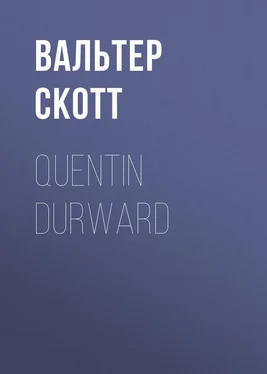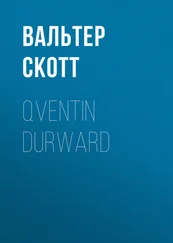Вальтер Скотт - Quentin Durward
Здесь есть возможность читать онлайн «Вальтер Скотт - Quentin Durward» — ознакомительный отрывок электронной книги совершенно бесплатно, а после прочтения отрывка купить полную версию. В некоторых случаях можно слушать аудио, скачать через торрент в формате fb2 и присутствует краткое содержание. Жанр: foreign_antique, foreign_prose, Альтернативная история, на английском языке. Описание произведения, (предисловие) а так же отзывы посетителей доступны на портале библиотеки ЛибКат.
- Название:Quentin Durward
- Автор:
- Жанр:
- Год:неизвестен
- ISBN:нет данных
- Рейтинг книги:3 / 5. Голосов: 1
-
Избранное:Добавить в избранное
- Отзывы:
-
Ваша оценка:
- 60
- 1
- 2
- 3
- 4
- 5
Quentin Durward: краткое содержание, описание и аннотация
Предлагаем к чтению аннотацию, описание, краткое содержание или предисловие (зависит от того, что написал сам автор книги «Quentin Durward»). Если вы не нашли необходимую информацию о книге — напишите в комментариях, мы постараемся отыскать её.
Quentin Durward — читать онлайн ознакомительный отрывок
Ниже представлен текст книги, разбитый по страницам. Система сохранения места последней прочитанной страницы, позволяет с удобством читать онлайн бесплатно книгу «Quentin Durward», без необходимости каждый раз заново искать на чём Вы остановились. Поставьте закладку, и сможете в любой момент перейти на страницу, на которой закончили чтение.
Интервал:
Закладка:
“That is right, that is well,” said his uncle. “Our King cares little what other theft thou mayst have made, but hath a horror at anything like a breach of the cloister. And I warrant thee, thou hadst no great treasure to bear thy charges?”
“Only a few pieces of silver,” said the youth; “for to you, fair uncle, I must make a free confession.”
“Alas!” replied Le Balafre, “that is hard. Now, though I am never a hoarder of my pay, because it doth ill to bear a charge about one in these perilous times, yet I always have (and I would advise you to follow my example) some odd gold chain, or bracelet, or carcanet, that serves for the ornament of my person, and can at need spare a superfluous link or two, or it may be a superfluous stone for sale, that can answer any immediate purpose. But you may ask, fair kinsman, how you are to come by such toys as this.” (He shook his chain with complacent triumph.) “They hang not on every bush – they grow not in the fields like the daffodils, with whose stalks children make knights’ collars. What then? – you may get such where I got this, in the service of the good King of France, where there is always wealth to be found, if a man has but the heart to seek it at the risk of a little life or so.”
“I understood,” said Quentin, evading a decision to which he felt himself as yet scarcely competent, “that the Duke of Burgundy keeps a more noble state than the King of France, and that there is more honour to be won under his banners – that good blows are struck there, and deeds of arms done; while the most Christian King, they say, gains his victories by his ambassadors’ tongues.”
“You speak like a foolish boy, fair nephew,” answered he with the scar; “and yet, I bethink me, when I came hither I was nearly as simple: I could never think of a King but what I supposed him either sitting under the high deas, and feasting amid his high vassals and Paladins, eating blanc mange, with a great gold crown upon his head, or else charging at the head of his troops like Charlemagne in the romaunts, or like Robert Bruce or William Wallace in our own true histories, such as Barbour and the Minstrel. Hark in thine ear, man – it is all moonshine in the water. Policy – policy does it all. But what is policy, you will say? It is an art this French King of ours has found out, to fight with other men’s swords, and to wage his soldiers out of other men’s purses. Ah! it is the wisest prince that ever put purple on his back – and yet he weareth not much of that neither – I see him often go plainer than I would think befitted me to do.”
[Charlemagne (742? -814): King of the Franks and crowned Emperor of the Holy Roman Empire in 800. His kingdom included Germany and France, the greater part of Italy, and Spain as far as the Ebro. As Emperor of the West he bore the title Caesar Augustus. He established churches and monasteries, and encouraged arts and learning. He figures largely in mediaeval minstrelsy, where the achievements of his knights, or paladins, rival those of Arthur’s court.]
[Robert Bruce: the grandson of Robert Bruce, the competitor with John Baliol for the Scottish throne. He defeated the English forces at Bannockburn in 1314, and thus secured the independence of Scotland, an independence which lasted until the two kingdoms were united under one crown in 1707.]
[William Wallace: another brave Scottish leader in the war for independence against Edward I of England. Wallace was betrayed in 1305 and carried to London, where he was cruelly executed as a traitor.]
[Barbour: an eminent Scottish poet contemporary with Chaucer. His principal work, The Bruce, records the life and deeds of Robert Bruce.]
[Harry the Minstrel or “Blind Harry” was the author of a poem on the life and deeds of Wallace which was held in peculiar reverence by the Scotch people.]
“But you meet not my exception, fair uncle,” answered young Durward; “I would serve, since serve I must in a foreign land, somewhere where a brave deed, were it my hap to do one, might work me a name.”
“I understand you, my fair nephew,” said the royal man at arms, “I understand you passing well; but you are unripe in these matters. The Duke of Burgundy is a hot brained, impetuous, pudding headed, iron ribbed dare all. He charges at the head of his nobles and native knights, his liegemen of Artois and Hainault; think you, if you were there, or if I were there myself, that we could be much farther forward than the Duke and all his brave nobles of his own land? If we were not up with them, we had a chance to be turned on the Provost Marshal’s hands for being slow in making to; if we were abreast of them, all would be called well and we might be thought to have deserved our pay; and grant that I was a spear’s length or so in the front, which is both difficult and dangerous in such a melee where all do their best, why, my lord Duke says in his Flemish tongue, when he sees a good blow struck, ‘Ha! gut getroffen [well struck]! a good lance – a brave Scot – give him a florin to drink our health;’ but neither rank, nor lands, nor treasures come to the stranger in such a service – all goes to the children of the soil.”
“And where should it go, in Heaven’s name, fair uncle?” demanded young Durward.
“To him that protects the children of the soil,” said Balafre, drawing up his gigantic height. “Thus says King Louis ‘My good French peasant – mine honest Jacques Bonhomme, get you to your tools, your plough and your harrow, your pruning knife and your hoe – here is my gallant Scot that will fight for you, and you shall only have the trouble to pay him. And you, my most serene duke, my illustrious count, and my most mighty marquis, e’en rein up your fiery courage till it is wanted, for it is apt to start out of the course, and to hurt its master; here are my companies of ordnance – here are my French Guards – here are, above all, my Scottish Archers, and mine honest Ludovic with the Scar, who will fight, as well or better than you, will fight with all that undisciplined valour which, in your father’s time, lost Cressy and Azincour [two famous victories in the Hundred Years’ War gained over the French by the English, near the towns of Crecy and Agincourt, in 1346 and 1415. See Shakespeare’s Henry V for a description of the latter.]. Now, see you not in which of these states a cavalier of fortune holds the highest rank, and must come to the highest honour?”
“I think I understand you, fair uncle,” answered the nephew; “but, in my mind, honour cannot be won where there is no risk. Sure, this is – I pray pardon me – an easy and almost slothful life, to mount guard round an elderly man whom no one thinks of harming, to spend summer day and winter night up in yonder battlements, and shut up all the while in iron cages, for fear you should desert your posts – uncle, uncle, it is but a hawk upon his perch, who is never carried out to the fields!”
“Now, by Saint Martin of Tours, the boy has some spirit! a right touch of the Lesly in him; much like myself, though always with a little more folly in it. Hark ye, youth – Long live the King of France! – scarce a day but there is some commission in hand, by which some of his followers may win both coin and credit. Think not that the bravest and most dangerous deeds are done by daylight. I could tell you of some, as scaling castles, making prisoners, and the like, where one who shall be nameless hath run higher risk and gained greater favour than any desperado in the train of desperate Charles of Burgundy. And if it please his Majesty to remain behind, and in the background, while such things are doing, he hath the more leisure of spirit to admire, and the more liberality of hand to reward the adventurers, whose dangers, perhaps, and whose feats of arms, he can better judge of than if he had personally shared them. Oh, ‘t is a sagacious and most politic monarch!”
Читать дальшеИнтервал:
Закладка:
Похожие книги на «Quentin Durward»
Представляем Вашему вниманию похожие книги на «Quentin Durward» списком для выбора. Мы отобрали схожую по названию и смыслу литературу в надежде предоставить читателям больше вариантов отыскать новые, интересные, ещё непрочитанные произведения.
Обсуждение, отзывы о книге «Quentin Durward» и просто собственные мнения читателей. Оставьте ваши комментарии, напишите, что Вы думаете о произведении, его смысле или главных героях. Укажите что конкретно понравилось, а что нет, и почему Вы так считаете.












